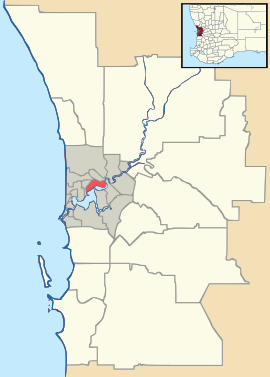Forrestdale, Western Australia
| Forrestdale Perth, Western Australia | |||||||||||||
|---|---|---|---|---|---|---|---|---|---|---|---|---|---|
 Forrestdale | |||||||||||||
| Coordinates | 32°08′53″S 115°56′28″E / 32.148°S 115.941°ECoordinates: 32°08′53″S 115°56′28″E / 32.148°S 115.941°E | ||||||||||||
| Population | 1,063 (2011 census)[1] | ||||||||||||
| • Density | 21.47/km2 (55.62/sq mi) | ||||||||||||
| Postcode(s) | 6112 | ||||||||||||
| Area | 49.5 km2 (19.1 sq mi) | ||||||||||||
| Location | |||||||||||||
| LGA(s) | City of Armadale | ||||||||||||
| State electorate(s) | Darling Range | ||||||||||||
| Federal Division(s) | Canning | ||||||||||||
| |||||||||||||
Forrestdale is a suburb of Perth, Western Australia, located within the City of Armadale.
Geography
Forrestdale is home to Forrestdale Lake, a nature reserve important for waterbirds, many of which breed there. It usually fills in winter and dries out in summer. The nature reserve contains the only known remaining habitat of Neopasiphae simplicior, a critically endangered native bee.[2] Tiger Snakes are commonly seen at this nature reserve along with Dugites.
Amenities and facilities
Forrestdale has a golf course.
References
- ↑ Australian Bureau of Statistics (31 October 2012). "Forrestdale (State Suburb)". 2011 Census QuickStats. Retrieved 11 March 2014.
- ↑ Burbidge, Andrew A (2004). "9. Invertebrates". Threatened animals of Western Australia. Department of Conservation and Land Management. p. 156. ISBN 0-7307-5549-5.
Distribution and habitat: The species [Neopasiphae Simplicior ] is found only near Perth. It has been collected at Cannington and near Forrestdale Lake around the Forrestdale golf course.